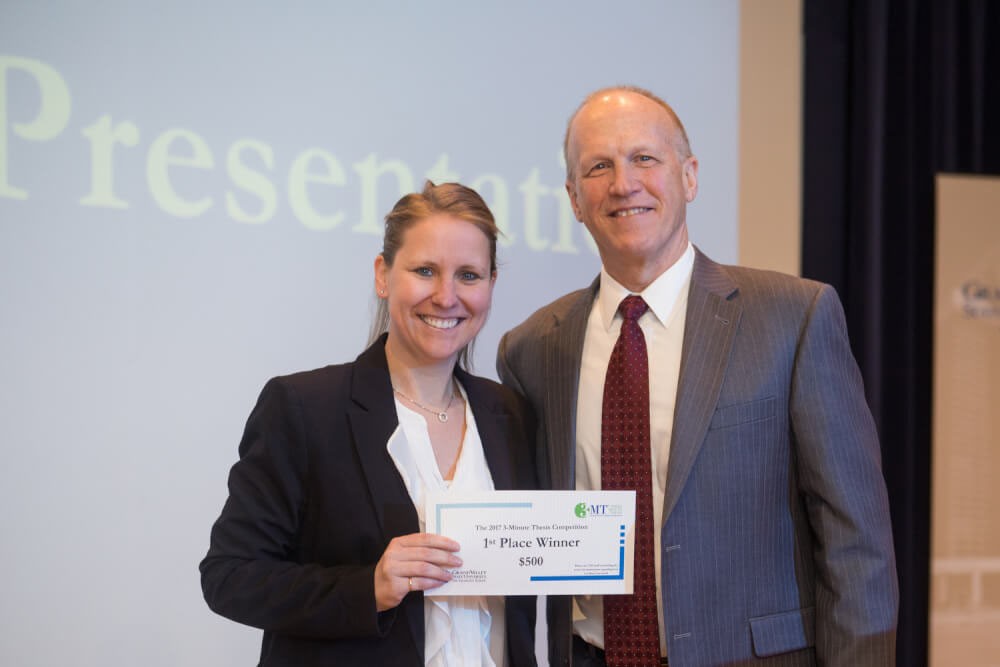3-Minute Thesis winner crowned

GVL / Courtesy – GVNow Kathryn Ellens with Jeff Potteiger, dean of The Graduate School.
Feb 19, 2018
Grand Valley State University graduate students had the opportunity to present their research to a panel of judges in a competitive and unique manner. Fifteen graduate students competed in the third annual 3-Minute Thesis (3MT) competition on Thursday, Feb. 15, in the DeVos Center Loosemore Auditorium.
The graduate students who participated were given one slide and three minutes to convey their knowledge to the audience. Prior to their admission into the competition, students were required to submit a synopsis of their research and a faculty letter of support.
Students from several disciplines (biology, criminal justice, cell and molecular biology, higher education, biomedical sciences and nursing) spoke on a variety of topics affecting the future of the environment and health. They discussed the problems discovered within their studies and proposed options for bettering tomorrow.
The first-prize winner and recipient of the $500 cash prize was nursing student Kathryn Ellens. She proposed “Rethinking Pain Management” and the opioid crisis arising from the stagnant reduction in the number of people reporting pain or intensity of the pain.
She presented her research that multimodal pain management could be another solution. This method works by combining two different pain medications that work differently in the body to relieve pain. This would help to reduce reliance on opioids while providing effective pain relief.
“I was naturally drawn to this topic,” Ellens said. “I’ve been a nurse for eight years. I’ve seen a lot of people in pain, a lot of them getting opioids for pain, and it never seemed to relieve pain in most people (in the) long term. I always thought there’s got to be something different.”
Although she was surprised with her first-place finish compared to the other contestants’ success, Ellens will be returning to Grand Rapids in April to represent GVSU at the Midwestern Association of Graduate Schools 3MT competition.
The second-place finisher and $250 cash recipient was biomedical sciences student Christopher Timmer. His presentation, “From the Dinner Pot to the Smoking Pot,” explained how better understanding cannabidiol could help alleviate anxiety and modulate hunger. Although treatment options include serotonin-regulating compounds, they hold an extensive list of side effects, while cannabidiol is non-psychoactive and has limited side effects. He tested this on crayfish, whose tails possess the same type of receptors that dictate anxiety in the brain to tell whether they should flee or fight when confronted.
Third-place finisher and $100 cash prize recipient Sarah Thompson spoke on her research about dopamine while studying cell and molecular biology. She discussed her experience working with the fast-scan cyclic voltammetry, which she helped modify to improve the way doctors study diseases such as Parkinson’s and Alzheimer’s.
Attendees were given the opportunity to vote for one of the contestants to receive the People’s Choice Award. This honor was bestowed to higher-education student Chelsea Hawkins for her presentation, “An Examination of the Relationship Between Use of Counseling Services and Emotion Resiliency Development.” She discussed her survey of more than 500 GVSU students, where her findings showed an average emotional resiliency score of 69 compared to the average U.S. population score of 82 using the Connor-Davidson Resilience Scale 25. These statistics emphasized her research and the need for increased use of mental health counseling services and destigmatizing mental illness on campus.
“The People’s Choice Award means a lot to me because it means everyone’s interested in my research, and I think it’s important,” Hawkins said. “I feel really honored and happy. I work with students every day, so I really think this research is going to help students. Mental health is something that affects all of us.”
For those in attendance, the event was an opportunity to learn about the efforts of GVSU graduate students.
“I think my biggest takeaway was the power of research,” said attendee Dashay Berry-Purnell. “When people hear (the word) research, it’s so extensive (that no one) wants to put the time into (it) or actually read (about it). But I think the presentations can help further (problem awareness) in society that we need to deal with.”

























